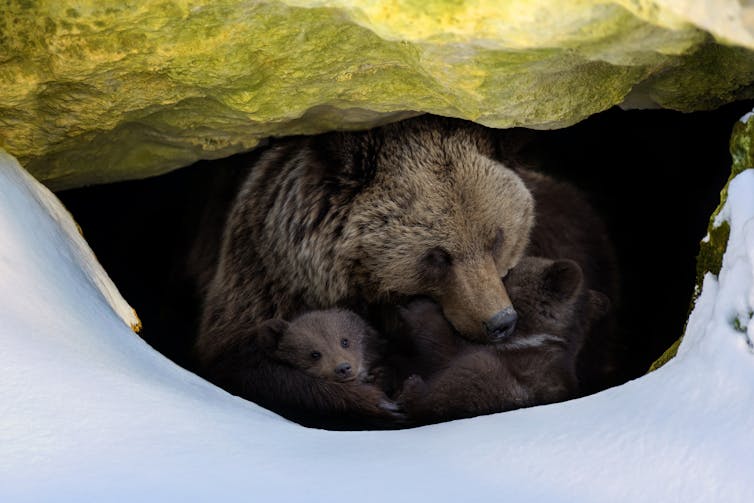Humans seem to have been adapted to the last ice age in similar ways to wolves and bears, according to our recent study, challenging longstanding theories about how and where our ancestors lived during this glacial period.
Previous studies have supported the view of most archaeologists that modern humans retreated into southern Europe during the height of the last ice age and expanded during the later increase in global temperatures. But our study is the first to use genetic data to show that at least some humans stayed in central Europe, unlike many other animals and despite our species having evolved in the much warmer climate of Africa.
Scientists have known since the 19th century that the distributions of animals and plants across the world may fluctuate with the climate. But the climate crisis has made it more important than ever to understand these fluctuations.
Populations of the same species that live in different places often have different genetics to each other. More recently scientists have studied how climate change has altered the distribution of these genetically distinct populations of species.
Most of the studies in this field focus on individual species of animal or plant. They have shown that many species, including humans, expanded their geographical ranges since the height of the last ice age, approximately 20,000 years ago.
At this time, European ice sheets reached Denmark and south Wales. Europe was cold but mostly unglaciated, probably much like Alaska or Siberia today.
Our team’s new study, led by Oxala García-Rodríguez at Bournemouth University, took a different approach and reviewed the genetic history of 23 common mammals in Europe. In addition to humans, these included rodents such as bank voles and red squirrels, insectivores like shrews and hedgehogs, ungulates like red deer and wild boar, and carnivores like brown bears and weasels.
An important metric in our study was where the greatest diversity is today across Europe. This is because areas of high genetic variation are likely to be the areas of longest occupation by species.
These areas, known as refugia, are locations where species retreated to survive during periods when environmental conditions were unfavourable elsewhere. For the mammals we studied, these refugia would have been occupied since the height of the last glaciation, at least. These refugia were probably the warmest areas or places where it was easiest for the animals to find food.
The genetic patterns we found include cases where some mammals (such as red foxes and roe deer) were restricted to glacial refugia in southern areas such as Iberia and Italy, and that they expanded from these areas as global temperatures warmed following the ice age. Other mammals (such as beavers and lynx) expanded from glacial refugia to the east of Europe only to spread west.
Species such as pygmy shrew and common vole had been restricted to sheltered areas such as deep valleys in northern Europe, small enclaves in otherwise inhospitable glacial landscapes. These patterns have previously been documented by other scientists.
But we found a fourth pattern. Our study indicated some species (such as brown bears and wolves) were already widely distributed across Europe during the height of the last glaciation with either no discernible refugia or with refugia both to the north and south.

This pattern includes Homo sapiens too. Neanderthals had already been extinct for around 20,000 years by this point.
It’s not clear why ancient humans and other animals in this group lived in this seemingly harsh climate rather than explore more hospitable places. But they seemed able to tolerate the ice age conditions while other animals withdrew to refugia.
Perhaps most important of all is that among the species that seem to conform to this pattern, where little or no geographical contraction in population took place at the height of the last ice age, are modern humans. It is particularly surprising that humans are in this group as our ancestors originated in Africa and it may seem unlikely that they were resilient to cold climates.
It is unclear whether these humans relied on ecological adaptation, for example the fact that they were omnivorous meant they could eat many different things, or whether they survived due to technology. For instance, it is well established that humans had clothing, built dwellings and controlled fire during the cold conditions of the last ice age.
This new pattern, and the inclusion of humans within it, could cause rethink of climate change and biogeography among scientists, especially for those studying human distribution changes. It could mean that some areas may be habitable for longer than expected as the climate changes.
John Stewart, Professor of Evolutionary Palaeoecology, Bournemouth University and Jeremy Searle, Professor of Ecology and Evolutionary Biology, Cornell University
This article is republished from The Conversation under a Creative Commons license. Read the original article.


